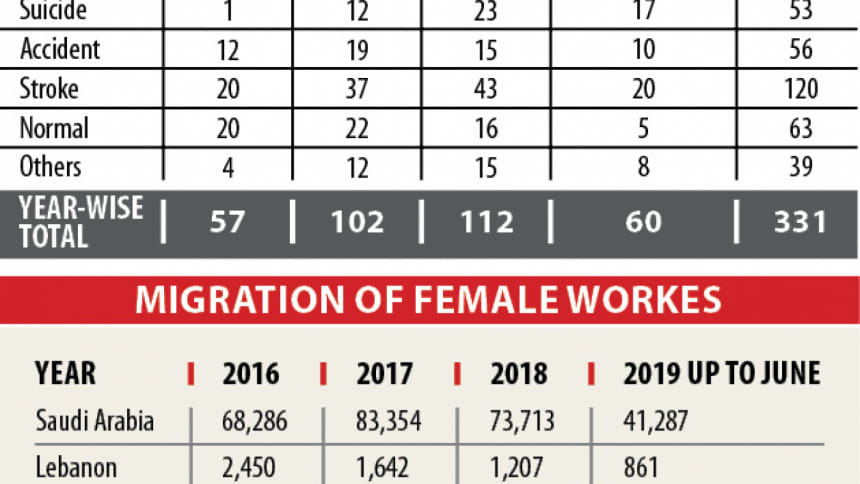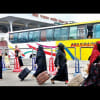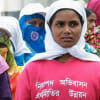Caravan of corpses getting longer

There was silence all around, except for some dogs mildly barking, in the middle of the night. Some ambulances were parked just outside the airport’s cargo area as five to six people sat on chairs under neon lights nearby.
They were waiting for the corpses of their family members returning from abroad.
Imran Sheikh, who came all the way from Jhenaidah to Hazrat Shahjalal International Airport, asked a security guard where he would find the body of his mother, Monoara Kanai Sardar, sent back from Saudi Arabia more than a year after her death.
As instructed, Imran, 22, and his father Jahangir Sheikh slowly entered an adjacent office to submit the documents required to receive the corpse.

Waiting at the corner, those people were sharing among themselves the stories of how their relatives worked hard in a foreign land and are now returning home dead. A broker, meanwhile, approached them to offer ambulance services at a low cost.
It was around 1:00am on June 28.
A cargo handling worker was seen pushing a stretcher with a coffin on it. Imran and his father, speechless, followed him until the coffin was put on an ambulance.
“This is the airport from where my mother had flown alive and healthy, but now she’s dead,” said Imran, from Raripara village in Kaliganj upazila. He is the only child of Monoara, 38.
“We don’t know why and how my mother died,” he told this correspondent just before getting on the ambulance.
According to the death certificate, Monoara died by suicide on May 11 last year, only a month after moving to Saudi Arabia as a domestic worker. She was employed by Laafi Waqqaf Haifan Al Rwuili in Al Jawf region of the oil-rich country.
“Why would my mother commit suicide?” said a shocked Imran after this correspondent saw the death report and asked him about it.
Shamim Mia, 33, wants an answer to the same question.
His sister Johura Begum, 35, of Munshiganj died by suicide in a Saudi employer’s residence in Jeddah in March last year, three months after her joining work there, documents show.
He said Johura’s employer called Shamim two days after the death and informed him about her passing. Later, Tipu Sultan, the broker who had arranged her visa, told Shamim Johura died of a stroke.
“My sister once told me by phone that she wanted to return home because she was facing some problems,” Shamim said.
“She had no sickness. It’s difficult to accept such death at this age. I request the authorities to probe these deaths.”
A survey by the BRAC Migration Programme has found questionable deaths of female migrant workers have been rising in the recent years.
Between 2016 and June this year, bodies of 311 women migrants were sent from the Middle East, mostly from Saudi Arabia.
Of them, 53 died by suicide, 120 due to stroke and 56 in accidents.
Over the years, deaths by suicide have seen an alarming rise -- from 1 in 2016 to 17 so far this year. This year, one in every three deaths is a suicide.
Sheepa Hafiza, executive director of Ain o Salish Kendra, said such high number of reported suicides and deaths in strokes raise a lot of suspicions and it called for an investigation.
“Employers in the Arab countries, especially in Saudi Arabia, consider these female domestic workers as slaves. So they behave however they please,” she said by phone last night.
In recent years, her organisation has helped rescue a number of female domestic workers from troubled situation in the Middle East.
“We’ve learnt they faced inhuman exploitation there. They cannot go outside and must do whatever their employers demand of them,” she said.
Shariful Hasan, head of BRAC Migration Programme, said they had been observing for about two years that hundreds of female migrants were returning every month, having suffered various forms of abuses. Some were physically and sexually abused. Others became pregnant and mentally imbalanced.
“Eventually, we discovered a rising number of them returning in coffins and many of them died reportedly by suicide,” he told The Daily Star.
It is a mystery why the poor women going to work abroad would commit suicide, he said.
“Some of the families we talked to said their relatives were abused while in the Middle East.”
The other two major factors are stroke and accident. “Women going to the Middle East are mostly aged between 20 and 40. Why would they suffer stroke?” asked Shariful.
Also, female migrants work indoors, and it is surprising that so many of them would die in accidents, he added.
“It was high time Bangladesh government investigated the cases seriously and identified why such unnatural deaths are happening in large numbers and took remedial actions.”
However, Mehedi Hasan, labour counsellor of Bangladesh embassy in Riyadh, said there was no scope for the Bangladesh authorities to investigate the matters in the Kingdom.
“The major issue is capacity development of the female migrants. Most problems arise out of the workers not being able to adjust to the environment, food and culture,” Mehedi told The Daily Star by phone.
Ahmed Munirus Salehin, additional secretary at the Ministry of Expatriates’ Welfare and Overseas Employment, said they were unaware that some female migrants died by suicides or due to strokes and road accidents.
“If that is the case, it should be investigated. We will look into the matter,” he said by phone recently.
While the authorities talk of actions, relatives of the migrants continue to suffer the trauma caused by such untimely losses.
Shamim Mia said his sister Johura had gone abroad to earn so she could educate her 11-year old son. “I am worried about the orphan. Who will take care of him?”

 For all latest news, follow The Daily Star's Google News channel.
For all latest news, follow The Daily Star's Google News channel. 






Comments